Brexit vote: Nine Tory tribes Theresa May needs to convince
- Published
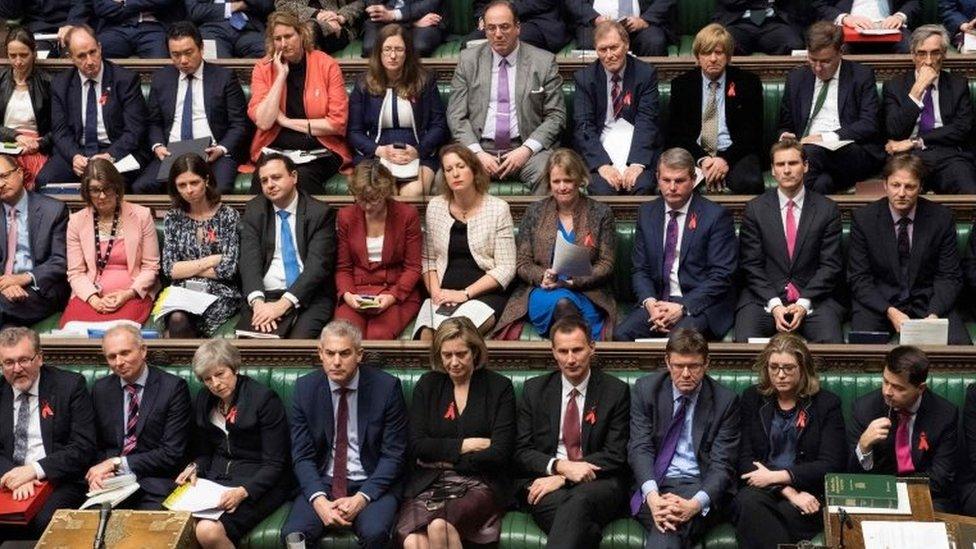
With a Commons vote on her Brexit agreement set for 11 December, Theresa May has less than two weeks to turn her fortunes around.
However, at this point, the prime minister's deal seems to have only further entrenched Tory battle lines against her.
The number of Conservative MPs against the deal currently floats at around 93, according to the latest BBC tally.
This only includes those who have explicitly stated they don't support it. Total opposition, including Tory MPs who have yet to publicly declare their position, is said to be well over 100.
There are 315 Tory MPs in Parliament - not counting two who are currently suspended - and they have splintered off into a bewildering array of factions over Brexit.
Here's a guide to the different groups.
Ardent Brexiteers
They're advocating, and have long advocated, leaving the EU without a deal in place, or on World Trade Organization (WTO) terms, and have categorically ruled out supporting the prime minister's deal.
Made up of the most fervent and veteran Brexit supporters within the European Research Group, the Eurosceptic think tank headed by Jacob Rees-Mogg, these MPs view achieving their version of Brexit as more important than keeping Theresa May in No 10.
Some, arguably, think it is even more important than keeping the Conservatives in government - although chances are you probably won't hear them admitting this publicly (the Democratic Unionist Party, who keep Mrs May in power, have recently hinted at this, if it means the deal's proposals for Northern Ireland can be ditched).
They are only a handful in number, but given Mrs May's increasingly slim parliamentary majority - with the DUP also opposed to her deal - this troublesome tribe could prove numerous enough to sink her deal.
'No Dealers'/WTO terms
This group thinks there is no longer enough time to realistically achieve a renegotiation of the deal on offer before the legislated exit day of 29 March 2019, as well as believing the prime minister has used up all her bargaining power and political capital in Brussels and has reached the point of no return, or, as numerous EU leaders stated last weekend: "This is it."
These Conservatives argue that a no-deal Brexit - where the UK would leave the EU on WTO trading terms - is better than the deal Mrs May has put on the table and the only option left in the face of what they view as an inevitable defeat in parliament.
Some cabinet ministers are rumoured to be quietly making the argument for a "negotiated no deal", whereby the UK's EU membership would be extended to allow the government to better prepare for leaving without a deal.
According to Article 50 rules, leaving without a deal is technically the default option for the UK should a deal not be reached, bar a change in government.
But despite this small group of advocates, a no-deal Brexit is not likely to get a majority of MPs in Parliament behind it.
Many MPs have vowed to find a way to prevent the UK from "crashing out", should the prime minister's deal be defeated in parliament.
'Advanced FTA'/'Super Canada'
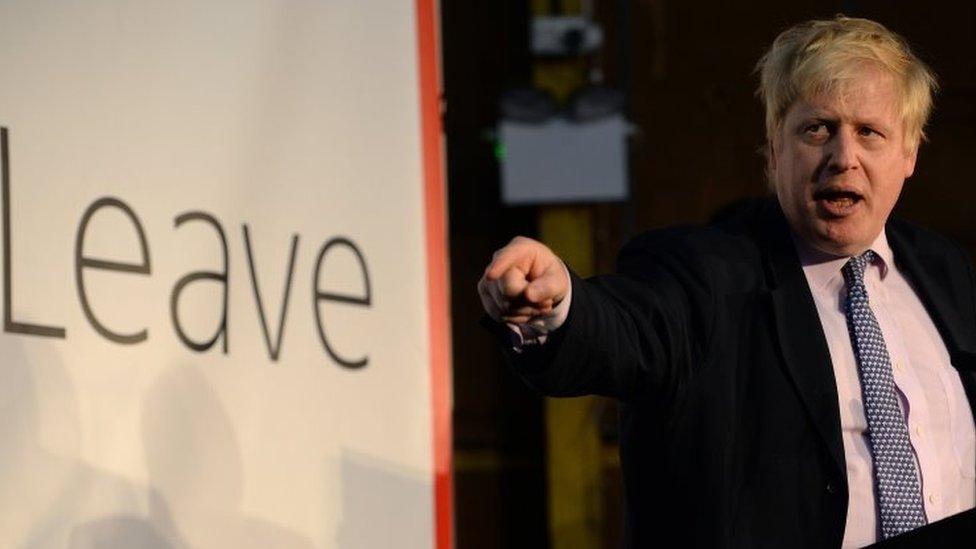
Boris Johnson: 'Super Canada' is the answer
Vocally-supported by the likes of Boris Johnson and former Brexit Secretary David Davis, who both resigned in July over Mrs May's Chequers blueprint, this group of mostly European Research Group members have been arguing for a Canada-style free trade agreement (also known as "Canada +++" or "Super Canada" in some circles) for some time.
Some MPs who previously resided in this tribe have broken off to align themselves with the aforementioned No Dealers faction.
Some at this point may be in favour of extending Article 50 in order to make room for renegotiation, despite extension being a previous red line for many in this group.
The group recently set out their vision for the UK again in a document entitled "Your Right to Know: the case against Chequers, external and the draft Withdrawal Agreement in plain English".
They claim a Canada-type deal - whereby the UK would be out of the single market and customs union, with no tariffs or quotas on any imports and exports between the UK and EU - is a "superior alternative" to the prime minister's deal.
Mrs May claims their solution fails to adequately solve the Irish border question in that the plan would create a hard border.
Many, if not all, in this group also have strong objections to the Irish backstop, and insist on it being binned in favour of no backstop at all.
Tory backbencher Nick Boles has branded their proposal a "Fantastic Beast of Johnsonian Folklore". Mr Boles is among those Conservatives arguing for a Norway-style Brexit instead.
'Norway Plus'/European Free Trade Area (EFTA)
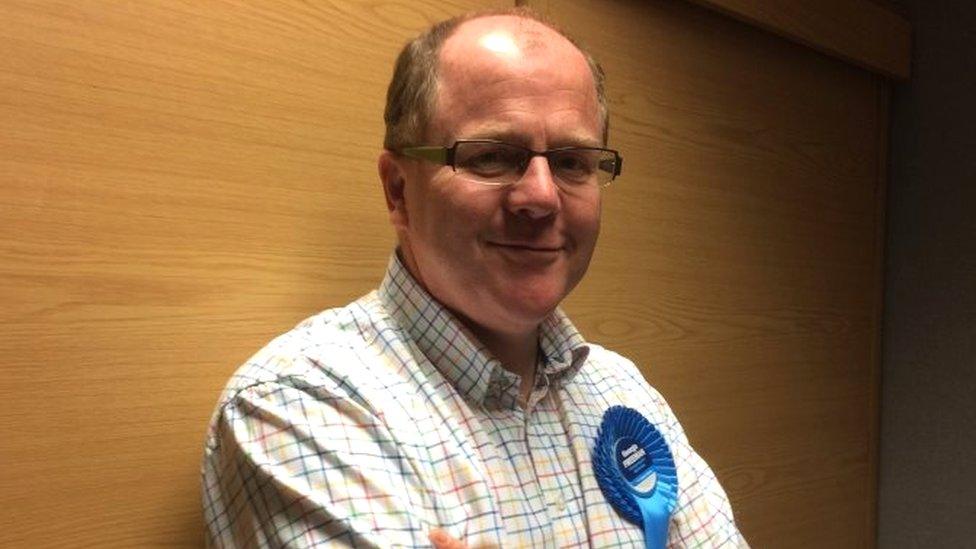
George Freeman: Norway is the only sensible option
The so-called "Norway Plus" option would see the UK retaining membership of the customs union and full access to the single market - meaning freedom of movement and the payments to the EU for market access the prime minister wants to end would likely continue.
But Norway's advocates say we'd be outside the Common Agricultural Policy (CAP) and outside the Common Fisheries Policy (CFP). Current EFTA members include Switzerland, Norway, Liechtenstein and Iceland.
This proposal has evolved since it was first put forward, when it said the UK should gain (or regain; we left in 1972 when we joined the EEC, under Edward Heath) temporary membership of EFTA for a few years until we negotiate a strong free trade deal.
However, the consensus in European diplomatic circles is that current members as well as the EU would be against temporary UK membership of the bloc.
Now, Norway is being pitched as an indefinite solution to a deal that looks likely to die on the doorstep of Parliament.
Conservatives such as George Freeman are claiming this proposal enjoys cross-party support and is "the only sensible way to deliver the EU referendum result".
Indeed, it's rumoured some cabinet ministers are willing to get on board with this option if the draft agreement falls in the Commons.
Prime minister's deal
The Conservatives who openly support the prime minister's deal are mainly made up of loyal government ministers.
The trouble is, there currently still aren't enough of them to get the prime minister's deal through Parliament - and there's still no ruling out even more ministerial resignations than we've already seen in between now and voting day.
Then there are the pragmatic backbenchers (see below for another breed of pragmatists who openly criticise the deal).
This group would normally make up a large, silent majority chunk in the middle of the party, shielding themselves from the din of ardent Leavers and Remainers.
They're normally loyal to party policy and vote accordingly on Brexit matters.
However, Theresa May's deal has melted away support even from this tribe, who were in fact dangerously shaky in numbers even before the deal was unveiled thanks to the Conservatives' lack of a working majority.
Renegotiated deal
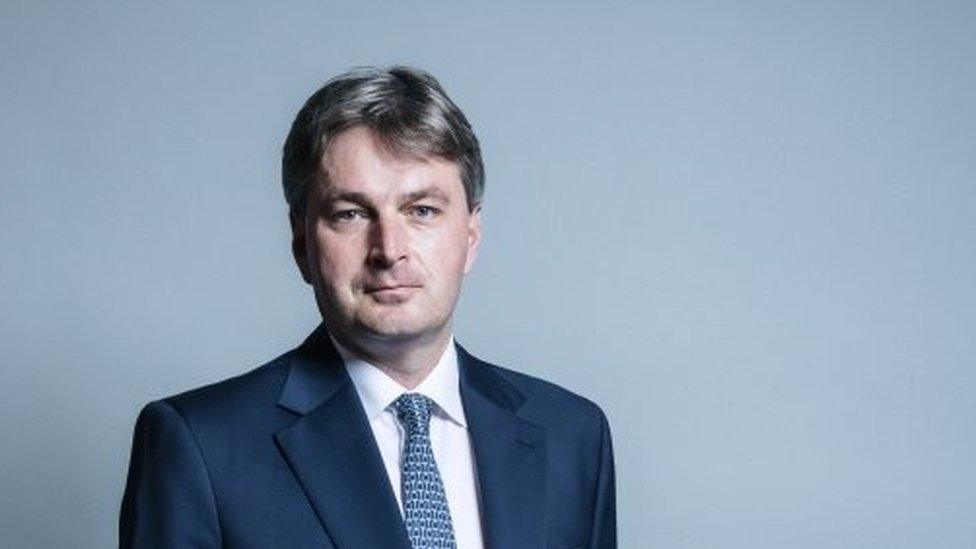
Daniel Kawczynski: Northern Ireland backstop is unacceptable
Though clear in their opposition to the prime minister's deal, not all Conservatives are giving up on it altogether.
The bulk of this tribe are made up of MPs who have serious concerns about the backstop proposals for Northern Ireland.
Daniel Kawczynski, MP for Shrewsbury, has emphasised the extent to which the backstop remains a sticking point with many backbenchers: "It is interesting the number of Conservative MPs that like me will swallow everything else they are not happy with, and may be persuaded.
"But the issue of part of the country being treated different to the rest is something many of us find completely unacceptable."
This group also includes the DUP, with leader Arlene Foster insisting that Theresa May can find "a third way, a better way".
However, other recent comments by Ms Foster, external, suggesting a Jeremy Corbyn-led government is preferable to the prime minister's deal, would relocate the Northern Irish party into a far more extreme tribe than this one.
Others have pointed to what they see as the positives in May's deal, such as ending freedom of movement and shielding the UK economy from the uncertainty of a no-deal Brexit.
Some also stress that there is room for more manoeuvre on the details of the future relationship.
But these upsides have so far failed to surmount other concerns, such as those surrounding aspects of the transition period, the role of the European Court of Justice and the £39bn "divorce payment".
Pragmatists
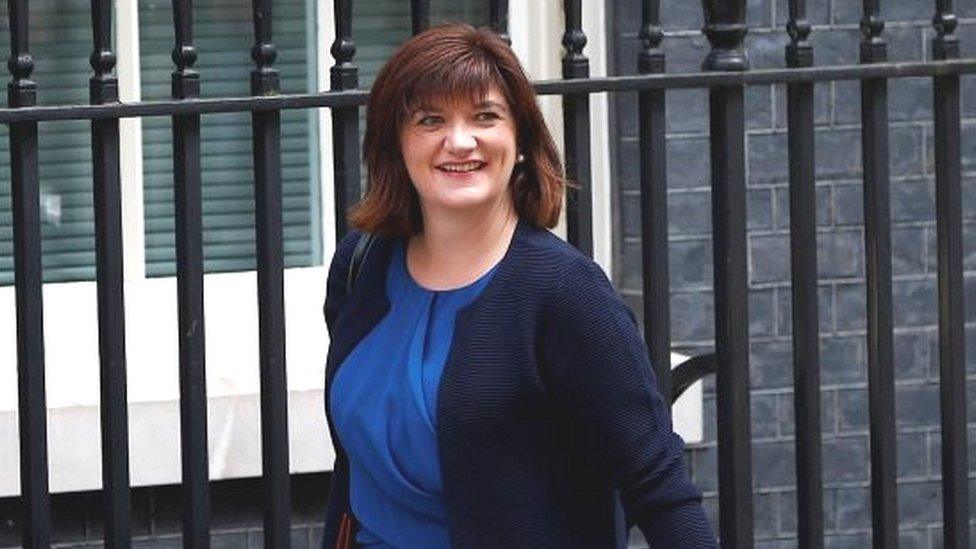
Nicky Morgan: Back the prime minister
These are the Conservatives who despite their distaste for the deal, are supporting it through gritted teeth.
It could be that many of these are choosing not to publicly state their position either way as of yet, but will begrudgingly cast their vote in favour when it comes to the day due to a lack of other options.
Theresa May will certainly be hoping this group increases in number in the coming weeks, as it seems clear that winning over direct converts from either side in large numbers is unlikely.
Lead pragmatist Nicky Morgan, previously of the Norway tribe, has called on MPs to discard their "entrenched positions" and back the prime minister.
Ken Clarke dubbed the deal "a bit of a dog's breakfast", but has vowed to support it regardless - despite being a veteran Remainer.
Remainers
This tribe would probably have viewed any deal as worse than staying in the EU.
Many privately support another referendum, but have yet to join the handful of Tory MPs who openly back the People's Vote campaign, alongside the likes of Justine Greening and Dominic Grieve.
If the prime minister's deal is rejected, a large group of MPs currently keeping quiet could come out to publicly support another referendum, aligning themselves with many Labour MPs.
Other parts of the tribe are hoping an EU Supreme Court ruling will see the UK being able to unilaterally revoke Article 50, potentially paving the way to cancel Brexit altogether.
People's Vote
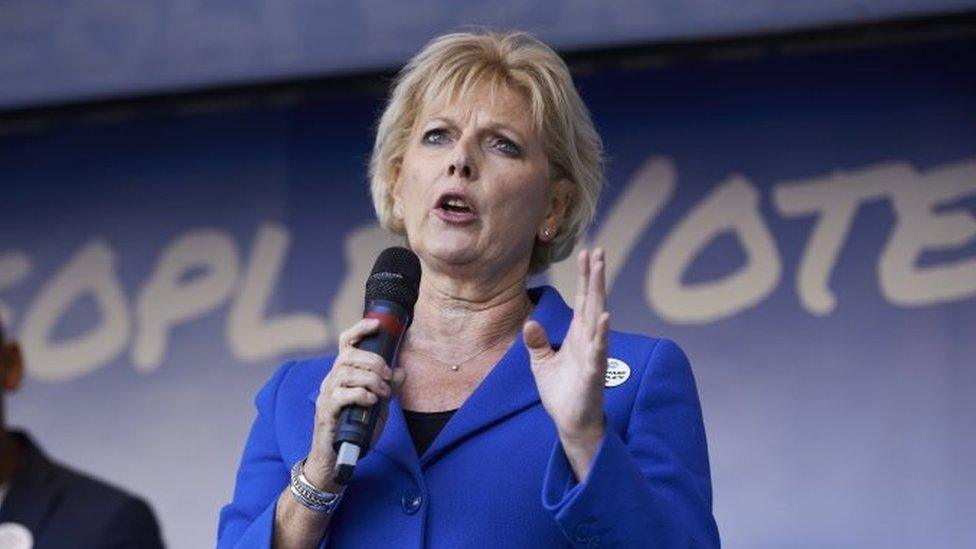
Anna Soubry: Country has made a terrible mistake
After Jo Johnson's recent resignation as a government minister and support for this option, the People's Vote campaign has received a Tory boost. This option is being sold as the only way to solve the current impasse in Parliament.
These Tories also campaign across party lines and stand shoulder-to-shoulder with Labour MPs such as Chuka Ummuna. The People's Vote campaign's march in Westminster recently attracted hundreds of thousands of supporters.
The campaign also has the support of former Prime Minister John Major, who told the BBC as early as July that the case for another referendum was "morally justified".
Leading campaigner Anna Soubry told the BBC: "The best deal we have with the EU is the current deal…people are realising our country has made a terrible mistake."